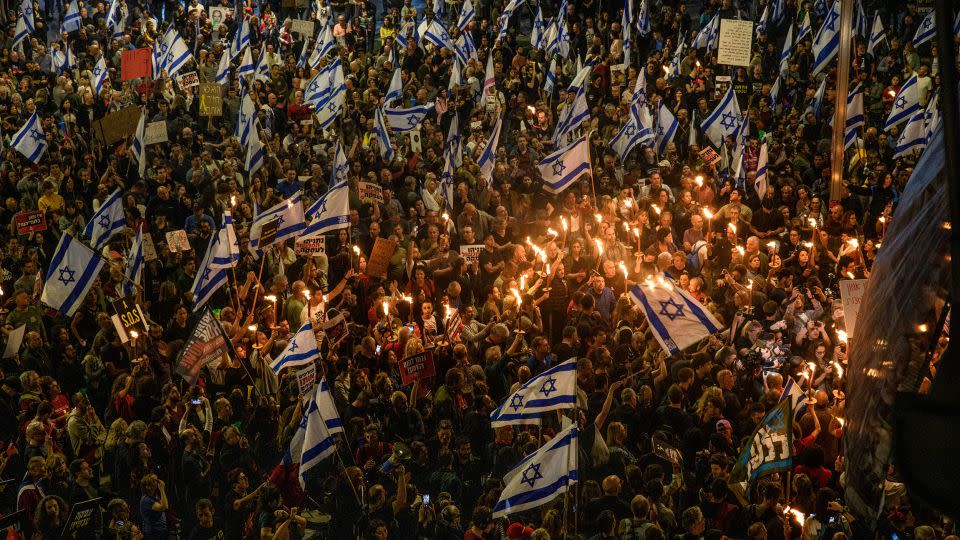Israel-Hamas ceasefire talks have stalled. Here’s why neither side may want a deal
Negotiations over a ceasefire and the release of hostages in Gaza have once again stalled as Israel and Hamas failed to reach an agreement on a framework this weekend.
The key sticking point is Hamas’ demand that Israel commits to ending the war as part of an agreement, which Israeli Prime Minister Benjamin Netanyahu has refused, two Israeli sources said.
But talks have not broken down altogether. The efforts to reach a deal will still continue this week and some Israeli officials hope that the evacuation orders in eastern Rafah, that can set the stage for an Israeli ground offensive, will pressure Hamas to change its position.
The leaders of Israel and the Palestinian militant group have failed to agree on a deal after months of negotiations, with Netanyahu and Hamas accusing each other of deliberately obstructing an agreement.
The last round of talks took place in Cairo over the weekend, with Israel waiting a week for Hamas to respond, but both sides emerged unsatisfied, showing few signs of a breakthrough.
Netanyahu on Sunday said he “cannot accept” Hamas’ demands. Hamas’ political bureau leader Ismail Haniyeh said in a statement the same day that the group was “still keen” to reach an agreement with mediators that includes a permanent ceasefire and complete withdrawal of Israeli troops from Gaza. Israel has maintained that its operation in Gaza will continue until Hamas is eradicated.
Haniyeh also lambasted the Israeli government and accused its leadership of seeking to “sabotage the efforts made through the mediators and various parties.”

Netanyahu in turn accused Hamas of making unacceptable demands in the Cairo talks, and that withdrawal from Gaza was out of the question. Israel had “demonstrated a willingness to go a long way” in the negotiations, he said, but Hamas’ demands meant surrender for Israel.
Experts say both sides are pushing for maximalist demands because their political survival depends on it.
“There’s no hostage deal because apparently neither side wants one,” Alon Pinkas, a former Israeli diplomat, told CNN. “This has to do with their respective concepts of ‘end of war’: If the war ends, Hamas can claim victory just by standing on its feet. Israel cannot. This difference prevents a deal.”
Frank Lowenstein, who worked as Special Envoy for Israeli-Palestinian Negotiations under US President Barack Obama during the 2014 Israel-Gaza war, said “both sides only want a ceasefire deal that ensures their political survival.”
“For Hamas, that’s a permanent ceasefire that allows them to retain some military capabilities. For Bibi (Netanyahu), it’s only a temporary pause on the path to ‘total victory’,” he told CNN.
Israel has said that the war could end if Hamas surrenders and hands over the hostages, which the militant group has refused to do, opting instead to push for a deal that would ensure its survival and continued control over Gaza.
Negotiation teams have for months oscillated toward and away from a deal, with talks mediated by the United States, Egypt and Qatar.
Critics have accused Netanyahu of prolonging the war to continue his grip on power and that of his far-right coalition amid calls for him to step down at home.
Pressure on Netanyahu
Seven months on, more than 100 captives remain in the enclave. On Saturday, Thousands protested in the Israeli city of Tel Aviv, demanding that Netanyahu accept a hostage deal as negotiators met in Cairo. Pinkas said that while the war prolongs Netanyahu’s tenure, it does not ensure it. “Quite the contrary,” he said.
A poll conducted between April 15 and 17 by the Israel Democracy Institute (IDI) found that 58% of Jewish Israelis believe that “the time has come for those who were responsible for the failure of October 7 to resign from their positions.”
Netanyahu has refused to hold elections and has not publicly taken responsibility for failure to prevent the October 7 attack.
The prime minister’s coalition is also at stake, with ministers pressuring him to press on with the war despite criticism from Israel’s allies in the West, including the US. Itamar Ben Gvir, Israel’s far-right National Security Minister, has threatened to leave Netanyahu’s coalition if a ceasefire is reached before Israel achieves its war aims.
Over the weekend, Ben Gvir warned that Netanyahu “knows very well what the price” of not sticking to “other commitments,” which the far-right minister said included pressing on with a ground incursion into the southern Gaza city of Rafah.
Israel has for months threatened to enter the city it says is Hamas’ last bastion, where over 1 million Palestinians are sheltering. The US has warned that it won’t support the operations unless Israel ensures the safety of civilians there.

On Sunday, after a barrage of rockets hit the Kerem Shalom crossing, killing three Israeli soldiers, Ben Gvir called on Netanyahu to “enter Rafah now.” The Al-Qassam Brigades, the military wing of Hamas, claimed the attack. Israel subsequently shut the crossing to humanitarian aid trucks.
Gazans began leaving eastern Rafah on Monday after Israel’s military issued a call for residents there to “evacuate immediately.” It’s not clear if the Kerem Shalom attack prompted the evacuation orders.
A senior Biden administration official told CNN Monday that Israel’s warnings about Rafah are “directly related” to the lack of progress in the ceasefire talks. Israel is trying to put pressure on Hamas, the official said.
A Rafah operation may however be in the interest of both Israel and Hamas, Lowenstein said.
“Bibi wants to show how tough he is by standing up to us (the US) and the world to defend Israel. And Hamas thinks he’s walking into a trap in Rafah that will leave Israel even more isolated, including from the US, and subject to even greater international condemnation.”
But Hamas is also wary of its fate if the war ends, experts say.
With Qatar being one of the few countries that engage with it, the militant group is surrounded by Arab and Western actors that don’t want to see it play a part in post-war Gaza.
Since the short ceasefire deal in November, Hamas has not been interested in a deal with Israel that doesn’t include a permanent end to the war, Lowenstein said, as the group believes that is the only scenario that ensures its survival.
Unless that deal takes place, Lowenstein said, Hamas is “more than happy to sacrifice the lives of thousands and thousands of innocent Palestinian civilians if they think it’s going to advance their cause.”
The current stagnation has been seen in previous mediation efforts between Hamas and Israel, Lowenstein added, when mediators “wanted a ceasefire much more than either one of the parties did.”
“If the sides don’t want a ceasefire, then it just won’t work,” he told CNN, “And that’s what we learned in 2014 in our negotiations.”
CNN’s Jeremy Diamond, Alex Marquardt, Ibrahim Dahman, Tim Lister, Michael Schwartz, Lauren Said-Moorhouse, Eugenia Yosef, Tareq El-Helou and Kareem Khadder contributed to this story.
For more CNN news and newsletters create an account at CNN.com


